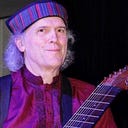But there are cultural contexts, inhabited by thousands and even millions of people, that believe that (something like) this sort of thing is OK. In Afghanistan, it is considered acceptable for a man to kiss his baby son's penis. Among some Australian Aboriginal tribes, men shake each other's penises as a form of greeting. In 19th century France, men who barely knew each other would kiss each other on both cheeks or even on the mouth. There are plenty of other stories that can be culled from Anthropology texts that are more shocking than these, but I think these make the point.
If you do any of these things in the wrong social context you will be considered something between a creep and a criminal. Some Afghani refugees in America sent some family photos to the drug store that contained images of a father kissing his son's penis. The entire family was put in prison, and the boy was put up for adoption. Was this the right thing to do? Should Afghanistan be forced to change this custom? Perhaps, but I don't think we even need to ask that sort of question in this situation. We can say decisively "that's not the sort of thing we do here", and still cut some slack for both this Afghani family and the Dalai Lama for not knowing this. We don't have to change our moral standards to accept an apology for an honest mistake, or automatically assume that any one raised by standards we reject is a psychopathic criminal.
The Dalai Lama upbringing was abnormal, not just by Western standards but by Tibetan standards as well. He was taken from his family when he was about 2 years old and was raised to adulthood by a group of celibate old men. They were all very fond of him, and may have expressed their affection in ways that are not acceptable to modern western standards. Does that make them child molesters if they did? Does that make him a child molester if he follows the standards he was taught? I don't think so.
Context can have more impact on our moral judgments then you might think. For one thing, the child was on stage because he asked for a hug during a question and answer session. The Video I have seen had the child's face obscured (and rightly so), so I don't see any evidence that the child was in any way forced. There also a comment on this Yahoo page which says that the Dalai Lama's "suck my tongue" was a slightly inaccurate translation of Tibetan Children's game (Rather like "I've got your nose" or "Peekaboo" in English) and not a literal request to suck his tongue. . "Tibetans told VICE World News that the meaning of this common expression used to tease and teach children is completely lost in cultural interpretation and its English translation. The correct phrase in Tibetan for this joke is “Che le sa”, which roughly translates to “Eat my tongue.” English is the Dalai Lama’s second language and Indian news outlets have reported that the leader speaks in broken English at public events"
https://news.yahoo.com/tibetan-leader-defends-dalai-lama-074644736.html
Equally importantly, there is a huge difference between 1) someone who was raised with different standards of moral courtesy, and 2) someone who was breaking their own moral standards to get their rocks off. This is not a Catholic priest forcing a child into a closet to perform a forbidden act, then threatening or cajoling him into silence. This was done in public before hundreds, perhaps thousands of people. The only reason he did it that way was that he sincerely believes there was nothing wrong in what he did. Now that he knows otherwise, he has apologized, and obviously will never do anything like this again.
The Man is not perfect and never claimed to be. He ends every lecture with "I hope you heard something useful, and if not just forget it." It would be a shame to lose the benefits of his wisdom because of this one strange glitch in his upbringing.
